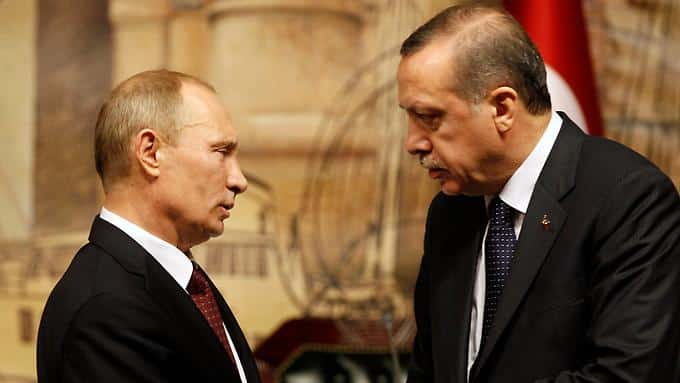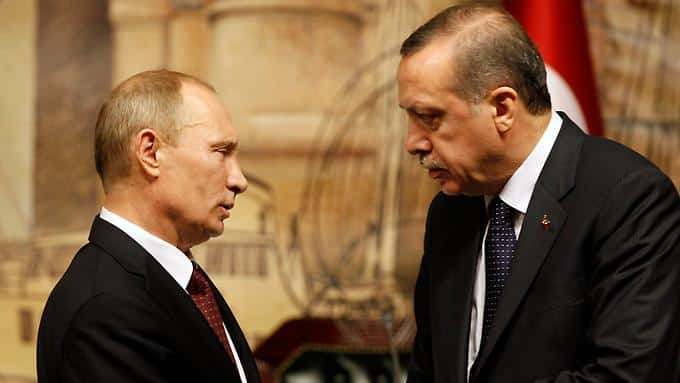Since February 2016 Russia had negotiated with the US about a peace deal on Syria. The main agreed upon point was to fight together against the Takfiris, mainly ISIS and al-Qaeda. The US in turn promised to separate the “moderate rebels” it supported from their close al-Qaeda ally. But that promise was never fulfilled. The US delayed and delayed and enabled new attacks by al-Qaeda and US proxy forces on Aleppo and elsewhere. It also instigated Kurdish YPG forces to attack the Syrian government in Hasakah. This was the strategic overreach that doomed the Kurds to a minor role in any upcoming solution.
Russia finally had enough and pulled the plug on further negotiations with the US The Syrian forces and their allies besieged Aleppo and liberated it. At the same time Turkey was allowed to invade Syria in the north eastern Aleppo governate to prevent a connection of Kurdish areas in the north-east and north-west of Syria. The probably US instigated putsch attempt against the Turkish government contributed to this change of alliances. Turkey decided to work with Russia and Iran to end the Syrian crisis (and to get as much out of it as possible.)
Before Christmas Erdogan met with Putin followed by a meeting of the Russian, Turkish and Iranian foreign and defense ministers. They decided to initiate peace talks:
Turkey said it will facilitate contacts between Syria’s government and opposition groups in preparation for peace talks organized together with Russia and Iran that aim to reach a nationwide cease-fire as the first step to ending an almost six-year civil war.
…
Russia, Turkey and Iran agreed in Moscow last week to seek a truce in Syria and hold peace talks in the Kazakh capital, Astana, in a joint approach that sidelines the US
Turkey today leaked further details of the talks (again providing that it is not untrustworthy):
Citing anonymous sources, reports said that the two sides have reached agreement on a draft plan for the implementation of a nationwide ceasefire in Syria, with the aim to extend the ceasefire deal in Aleppo throughout the country.
The sources said that Turkey and Russia will aim to ensure that the ceasefire takes effect starting Wednesday night. Later on, Foreign Minister Mevlüt Çavuşoğlu said that the deal could be reached at any moment soon and reiterated that Turkey is in favor of a political solution.
…
Terrorist organizations will be excluded from the ceasefire, the sources added.
Among lots of rumors, leaked by interested sides, the parameters that evolve seem to be the following:
There are several points that are unclear and left to further negotiations:
Neither the Syrian government nor Iran has yet officially agreed to the outlined deal. Some “moderate rebel” groups agreed to it while others (Ahrar) claim they have not yet been asked. Russia says the deal is still not sealed and needs more work.
While the deal is unfinished there is already some movement on the ground that shows that it is likely real:
The talks and ceasefires will be on and off throughout the next months. All parties will try to gain the maximum for their side. At times the negotiations will take place on the battle field. But unlike the US which would not deliver on its promises but kept supporting every “rebel” offense, Turkey can and likely will likely deliver. It has no where else to go. It also has the power to close its borders and to deny its “rebels” as well as al-Qaeda the resupplies needed for continued fighting.
Syria and its allies are in a military superior position and will have to keep on the pressure, especially on the al-Qaeda controlled Idleb region, to press the other parties to stick to a deal.
The real significance of the deal is that it is excluding the US and EU from these talks. That has not happened on a Middle East issue for a long time. The US has overreached with Secretary of State Kerry promising this and that but never delivering on his words. The US lost the game. The Obama administration is miffed and will certainly try to throw in some spoilers and to make it as difficult as possible for the upcoming Trump administration to change course.
It is still a long way to peace in Syria but the perspective is now more promising than it has been for a long time.
Reprinted with permission from Moon of Alabama.


